九年级英语上册 单词教案 人教新目标版
【人教版新目标】九年级上学期英语:全一册英文版教案(182页,Word版)
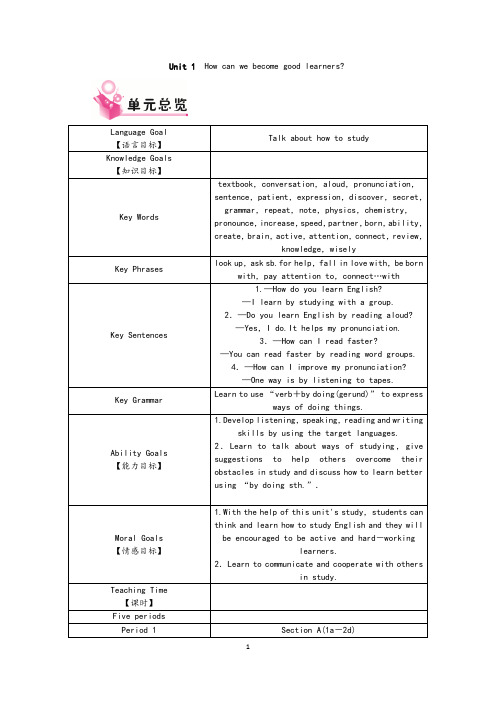
Unit 1How can we become good learners?本单元围绕学习的话题,讲述了学习的障碍及对应的解决方法,对学生的学习有重要意义。
Section A内容上侧重英语学习的方法,学生要学习、训练相关的语言内容和技能。
学生要重点掌握并能熟练、正确地运用与学习主题相关的单词和各种表达学习方法的短语、功能及句型结构How do you study/learn…?I study/learn…by…How can I…?You can…by…;以及学会用“by+v.-ing形式”结构来表达方式方法。
Section B在Section A 谈论英语学习的基础上,在话题上,从英语的学习困难及解决方案,拓展到优秀学习者的学习习惯;在语言上,巩固和丰富了与学习相关的话题词汇;在技能上,将听、说能力综合,突出阅读训练,由读促写;在策略上,引导学生关注优秀学生的学习方式,并借鉴运用;在情感上,鼓励学生面对困难,积极探索解决方案,不断改进学习方法,提高学习效率。
The First Period—Section A(1a-2d)Teaching Important Points【教学重点】Key words & phrases:textbook,conversation,aloud,pronunciation,sentence,patient;study for,ask the teacher for help,work with a group,be patientKey sentences:1.—How do you study for a test?—I study by working with a group.2.—Does anyone learn English by watching videos?—No.It's too hard to understand spoken English.3.—Have you ever studied with a group?—Yes,I have.I've learned a lot that way.Key structure:verb+by doingeg:I study by working with a group.Teaching Difficult Points【教学难点】★Practice the structure “verb+by doing” in listening and speaking.Teaching Aids【教学工具】A tape recorder,CAI or multimedia courseware.Teaching Steps【教学过程】★Step 1Leading in【新课导入】(Ⅰ)1.GreetingGreet the class and briefly talk with the students about their holidays.2.DiscussingDiscuss with the students,like this:T:What do you usually do when you study English?S1:I often read English books.T:(To class) Good.He studies English by reading English books.That's a good way.(Then to another student)Now,what do you usually do when you study English?S2:I…3.Practice with more students.★Step 1Leading in【新课导入】(Ⅱ)1.GreetingGreet the class and tell the students the goal of this unit.2.PreparationT:Today we are going to talk about how to study.How do you study English?Collect the students' answers and prepare the language items for this period.★Step 2Cooperative inquiry【合作探究】1.Finish the task in 1a①Work in groups.Add more ways of studying English.②Read these phrases in 1a.Tell them the usage of “by doing” phrases.③Help students to say out their ways of studying.2.Finish the task in 1b①Read the instructions.②Play t he recording for the first time.Students only listen.③Play the recording a second time.Ask them to match the ways with the names.④Check the answers with the whole class.3.Finish the task in 1c①In groups,interview their partners about how they study for a test.②One from each group reports to the class.4.Finish the tasks in 2a-2b①Use PPT or pictures for the students to learn the new words.Read the questions in 2a.②Get the students to guess the answers in 2b.③Play the recording for the first time.Stud ents listen and check the questions.④Play the recording again.Students listen and match the answers with the questions in 1a.⑤Check the answers with the whole class.5.Finish the task in 2c①Show the pictures of the conversations.②Students work in pairs.③Ask three pairs to say out their conversations to the class.Show the PPT to help.6.Finish the task in 2d①Talk about the picture and scan the conversation.②Ask the students to read aloud the conversation in 2d.Learn the new words and phrases.③Ask the se questions:How does Jack feel at the very start?What makes him feel like this(nervous)?What's Jack's problem when he reads?And what does Annie suggest?What's Jack's problem with words?And what's Annie's advice?④Check the answers with individual stud ents to see how well they understand.⑤Play the recording and get the students to follow the teacher in the recording.Then ask two pairs to act out the conversation.★Step 3Homework1.Do a survey:How do you study for an English test?2.Imagine that you are Jack and Annie.Make a conversation to talk about your English study.3.Translate the following sentences into English.(1)你是怎样学习英语的?我通过大量阅读来学习。
人教版新目标英语九年级上册优质教案(全册)
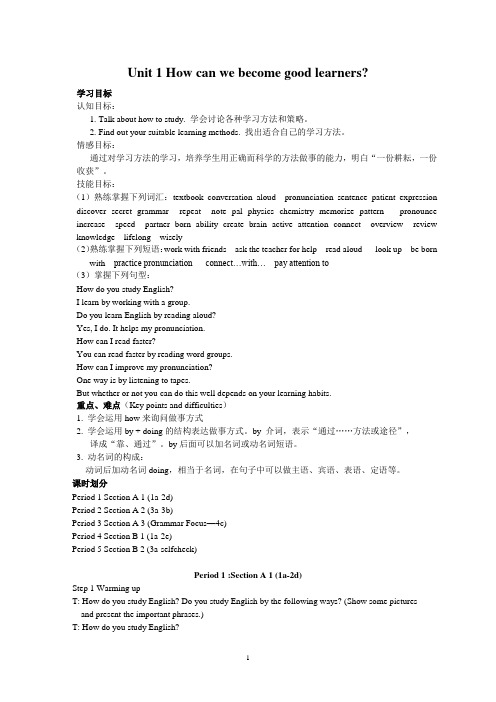
Unit 1 How can we become good learners?学习目标认知目标:1. Talk about how to study. 学会讨论各种学习方法和策略。
2. Find out your suitable learning methods. 找出适合自己的学习方法。
情感目标:通过对学习方法的学习,培养学生用正确而科学的方法做事的能力,明白“一份耕耘,一份收获”。
技能目标:(1)熟练掌握下列词汇:textbook conversation aloud pronunciation sentence patient expression discover secret grammar repeat note pal physics chemistry memorize pattern pronounce increase speed partner born ability create brain active attention connect overview review knowledge lifelong wisely(2)熟练掌握下列短语:work with friends ask the teacher for help read aloud look up be born with practice pronunciation connect…with… pay attention to(3)掌握下列句型:How do you study English?I learn by working with a group.Do you learn English by reading aloud?Yes, I do. It helps my pronunciation.How can I read faster?You can read faster by reading word groups.How can I improve my pronunciation?One way is by listening to tapes.But whether or not you can do this well depends on your learning habits.重点、难点(Key points and difficulties)1. 学会运用how来询问做事方式2. 学会运用by + doing的结构表达做事方式。
人教版PEP新目标 初三九年级英语 上册第一学期秋季 (教学设计 教案)(上学期 上半年 全册 分单元 课时)
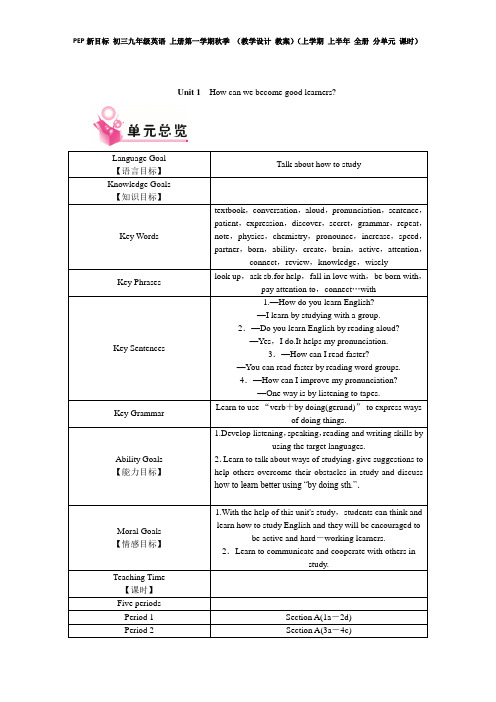
Unit 1How can we become good learners?本单元围绕学习的话题,讲述了学习的障碍及对应的解决方法,对学生的学习有重要意义。
Section A内容上侧重英语学习的方法,学生要学习、训练相关的语言内容和技能。
学生要重点掌握并能熟练、正确地运用与学习主题相关的单词和各种表达学习方法的短语、功能及句型结构How do you study/learn…?I study/learn…by…How can I…?You can…by…;以及学会用“by+v.-ing形式”结构来表达方式方法。
Section B在Section A谈论英语学习的基础上,在话题上,从英语的学习困难及解决方案,拓展到优秀学习者的学习习惯;在语言上,巩固和丰富了与学习相关的话题词汇;在技能上,将听、说能力综合,突出阅读训练,由读促写;在策略上,引导学生关注优秀学生的学习方式,并借鉴运用;在情感上,鼓励学生面对困难,积极探索解决方案,不断改进学习方法,提高学习效率。
The First Period—Section A(1a-2d)Teaching Important Points【教学重点】Key words & phrases:textbook,conversation,aloud,pronunciation,sentence,patient;study for,ask the teacher for help,work with a group,be patientKey sentences:1.—How do you study for a test?—I study by working with a group.2.—Does anyone learn English by watching videos?—No.It's too hard to understand spoken English.3.—Have you ever studied with a group?—Yes,I have.I've learned a lot that way.Key structure:verb+by doingeg:I study by working with a group.Teaching Difficult Points【教学难点】★Practice the structure “verb+by doing” in listening and speaking.Teaching Aids【教学工具】A tape recorder,CAI or multimedia courseware.Teaching Steps【教学过程】★Step 1Leading in【新课导入】(Ⅰ)1.GreetingGreet the class and briefly talk with the students about their holidays.2.DiscussingDiscuss with the students,like this:T:What do you usually do when you study English?S1:I often read English books.T:(To class) Good.He studies English by reading English books.That's a good way.(Then to another student)Now,what do you usually do when you study English?S2:I…3.Practice with more students.★Step 1Leading in【新课导入】(Ⅱ)1.GreetingGreet the class and tell the students the goal of this unit.2.PreparationT:Today we are going to talk about how to study.How do you study English?Collect the students' answers and prepare the language items for this period.★Step 2Cooperative inquiry【合作探究】1.Finish the task in 1a①Work in groups.Add more ways of studying English.②Read these phrases in 1a.Tell them the usage of “by doing” phrases.③Help students to say out their ways of studying.2.Finish the task in 1b①Read the instructions.②Play the recording for the first time.Students only listen.③Play the recording a second time.Ask them to match the ways with the names.④Check the answers with the whole class.3.Finish the task in 1c①In groups,interview their partners about how they study for a test.②One from each group reports to the class.4.Finish the tasks in 2a-2b①Use PPT or pictures for the students to learn the new words.Read the questions in 2a.②Get the students to guess the answers in 2b.③Play the recording for the first time.Students listen and check the questions.④Play the recording again.Students listen and match the answers with the questions in 1a.⑤Check the answers with the whole class.5.Finish the task in 2c①Show the pictures of the conversations.②Students work in pairs.③Ask three pairs to say out their conversations to the class.Show the PPT to help.6.Finish the task in 2d①Talk about the picture and scan the conversation.②Ask the students to read aloud the conversation in 2d.Learn the new words and phrases.③Ask these questions:How does Jack feel at the very start?What makes him feel like this(nervous)?What's Jack's problem when he reads?And what does Annie suggest?What's Jack's problem with words?And what's Annie's advice?④Check the answers with individual students to see how well they understand.⑤Play the recording and get the students to follow the teacher in the recording.Then ask two pairs to act out the conversation.★Step 3Homework1.Do a survey:How do you study for an English test?2.Imagine that you are Jack and Annie.Make a conversation to talk about your English study.3.Translate the following sentences into English.(1)你是怎样学习英语的?我通过大量阅读来学习。
人教版九年级英语上册教案(Unit1-10单元)新目标-人教新目标版九年级全册

中(小)学教师统一备课用纸I. GreetingGood morning, class. Nice to see you.II. Presentation1.T: How do you go /come / get to school?S: I go / come / get to school by busby trainon foot2.Look at 1aHow do you study for a test?I study by working with friends.by making flashcardsby reading the textbook.4. 1b. Listen and write letters from the pictures above.Mei studies by flashcards.Pierre studies by asking the teacher for help.Antonio studies by listening to the tapes.5. 1c. PairworkS a: How do you study for a test?S b: I study by working with a group.Ask the students to practice in pairs.Ask some pairs to act out.III. Presentation1. 2a Listen and check the questions you hear.1√ 2√ 4√ 5√2. 2b. Listen again and match each question above with an answer below.1 d2 b 4 c 5 a中(小)学教师统一备课用纸中(小)学教师统一备课用纸中(小)学教师统一备课用纸中(小)学教师统一备课用纸Listen to the tape carefully.Listen again and fill in the blanksTeaching 1c Oral practice.A: Did Mario use to be short? B: Yes, he did. Now he is tall.Say: You will hear a boy and a girl talking to each other at a party.Some people surely changed a lot. Listen and check the words you hear.Teacher 2bAsk the students to fill in blanks with the words they hear.Role play in pairs.中(小)学教师统一备课用纸The man used to have long hair, but now he has short hair. He used to be shy, now he is outgoing.The woman used to be fat, now she is thin.中(小)学教师统一备课用纸S1: A girl is exercising in gym class in picture 1.S2: A girl is paining a picture in picture 2.S3: Students are singing in music class in picture 3.A boy is looking at spiders and other insects in picture 4.中(小)学教师统一备课用纸中(小)学教师统一备课用纸中(小)学教师统一备课用纸中(小)学教师统一备课用纸中(小)学教师统一备课用纸中(小)学教师统一备课用纸中(小)学教师统一备课用纸中(小)学教师统一备课用纸中(小)学教师统一备课用纸中(小)学教师统一备课用纸中(小)学教师统一备课用纸中(小)学教师统一备课用纸中(小)学教师统一备课用纸中(小)学教师统一备课用纸中(小)学教师统一备课用纸中(小)学教师统一备课用纸。
人教版九年级上册英语教案(优秀5篇)

人教版九年级上册英语教案(优秀5篇)(经典版)编制人:__________________审核人:__________________审批人:__________________编制单位:__________________编制时间:____年____月____日序言下载提示:该文档是本店铺精心编制而成的,希望大家下载后,能够帮助大家解决实际问题。
文档下载后可定制修改,请根据实际需要进行调整和使用,谢谢!并且,本店铺为大家提供各种类型的经典范文,如合同协议、条据文书、策划方案、总结报告、党团资料、读书笔记、读后感、作文大全、教案资料、其他范文等等,想了解不同范文格式和写法,敬请关注!Download tips: This document is carefully compiled by this editor. I hope that after you download it, it can help you solve practical problems. The document can be customized and modified after downloading, please adjust and use it according to actual needs, thank you!Moreover, our store provides various types of classic sample essays, such as contract agreements, documentary evidence, planning plans, summary reports, party and youth organization materials, reading notes, post reading reflections, essay encyclopedias, lesson plan materials, other sample essays, etc. If you want to learn about different formats and writing methods of sample essays, please stay tuned!人教版九年级上册英语教案(优秀5篇)九年级是整个初中阶段的重要一年,因此教师需要学习先进的教育理念,认真准备每一次教案。
2023最新版-人教版九年级上册英语教案【最新4篇】

人教版九年级上册英语教案【最新4篇】九年级上册英语教案篇一一、教学内容本课是第二单元的最后一课,阅读课,是本单元话题过去的某种状态的延伸和继续。
文章讲得主要内容是一个老是惹麻烦的男孩在明白了母亲对他的爱之后变成一个好孩子的故事。
二、教学目标⑴掌握一些主要的词汇和句型used to be like 等。
⑴引导学生理解课文内容,掌握阅读技巧,如扫读、细读、概括文章大意,利用上下文信息猜词等。
⑴通过阅读课文,并设计各种活动训练学生运用英语进行听说读写各种活动的能力。
⑴激发学生感恩父母,热爱父母,关注身边的人的情感。
三、教学重点和难点⑴训练学生利用上下文信息填写词汇和句子的能力。
⑴培养学生的阅读策略和写作能力。
⑴利用本课所学知识表达个人意见,对课文进行深层理解。
四、设计理念依据纽南(David Nunan)所提出的任务型及合作式教学原则,使学生在小组学习中获取信息,处理信息和运用信息,激发学生用所学语言进行交际的愿望和自信心,促进合作精神和文化意识的发展。
五、教学设计1. 总体思路:本节课是在多媒体的课堂教学环境下实施的大容量、快节奏的课堂教学。
笔者先让学生简短描述父母以前和现在的职业,外貌,性格,爱好再欣赏英文歌曲thank you, dad. 导入,酝酿了一种感激父母的氛围,接着引导他们畅诉父母对自己的帮助的故事,然后让学生阅读短文,感受母亲爱的伟大。
在阅读过程中,通过让学生看标题,预测课文内容、概括文章段落大意、根据上下文填所缺的句子,判断正误等各种方式提高阅读技能。
最后,笔者提供关键词让学生复述课文,使其能熟练得掌握所学的重点词汇、短语和句子。
阅读后,笔者抛出这样的问题让学生讨论:我们该用什么方式报答父母?培养学生反哺意识。
最后通过写作,提高学生综合运用语言的能力。
Step1 Pre-reading1. Get the students to describe their parentsT: Parents are the most familiar and loved person to you. Can you give a brief description of them? You can describe what they used to be like and what they are like now.(students may describe their age, appearance, personality, hobbies they used to be and now.)设计说明通过谈论父母以前和现在的外貌,个性,爱好职业等既复习了本单元的语言功能项目,延续了本单元的话题,又能成功地引进本课要谈论和阅读的内容:父母的爱。
2020年人教版新目标英语九年级上册优质教案(全册)
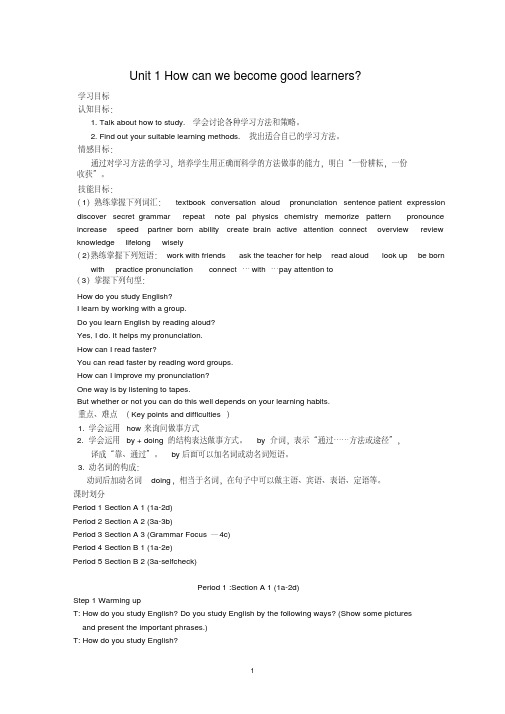
3。
4) by 可用于构成 (2) ________ ,“被,由”,如句 4。
5) by 可表示方式或手段, (3) “ ____________”结构在句中作方式状语,“通过……方式(方
法)”或“借助……手段”,如句 5。
Keys: (1) 在……旁边 (2) 被动语态 (3) by + V-ing 形式 【运用】根据提示,用含有 by 的短语完成各句。
2. 2c Role-play the conversation. Step 8 Summary
How do you study English? 1. by working with friends 2. by watching English movies.
3. by making word cards. 4. by reading the textbook. 5. by listening to tapes.
6. by asking the teacher for help. 7. by reading aloud.
… Step 9 Language points 1. I study by working with a group. 我通过小组活动来学习。
by 作为介词,用法很多。请仔细观察下面的例句,分析 容。 【例句】
1) Annie went to Beijing _______ ( 乘火车 ) yesterday. 2) His grandfather made a living _________ ( 靠卖水果 ) in the past. 3) The scientists have to arrive at the village _________ ( 八月以前 ). 4) Allen goes _______________ ( 经过邮局 ) on his way to school every morning. 5) The book was written ____________ ( 由几个工程师 ).
人教版九年级上册英语教案(优秀8篇)

人教版九年级上册英语教案(优秀8篇)作为一位兢兢业业的人民教师,总归要知道如何编写一份优秀的教案。
这次为您整理了8篇《人教版九年级上册英语教案》,亲的肯定与分享是对我们最大的鼓励。
九年级上册英语教案篇一一、教学内容本课是第二单元的最后一课,阅读课,是本单元话题过去的某种状态的延伸和继续。
文章讲得主要内容是一个老是惹麻烦的男孩在明白了母亲对他的爱之后变成一个好孩子的故事。
二、教学目标⑴掌握一些主要的词汇和句型used to be like 等。
⑴引导学生理解课文内容,掌握阅读技巧,如扫读、细读、概括文章大意,利用上下文信息猜词等。
⑴通过阅读课文,并设计各种活动训练学生运用英语进行听说读写各种活动的能力。
⑴激发学生感恩父母,热爱父母,关注身边的人的情感。
三、教学重点和难点⑴训练学生利用上下文信息填写词汇和句子的能力。
⑴培养学生的阅读策略和写作能力。
⑴利用本课所学知识表达个人意见,对课文进行深层理解。
四、设计理念依据纽南(David Nunan)所提出的任务型及合作式教学原则,使学生在小组学习中获取信息,处理信息和运用信息,激发学生用所学语言进行交际的愿望和自信心,促进合作精神和文化意识的发展。
五、教学设计1. 总体思路:本节课是在多媒体的课堂教学环境下实施的大容量、快节奏的课堂教学。
笔者先让学生简短描述父母以前和现在的职业,外貌,性格,爱好再欣赏英文歌曲thank you, dad. 导入,酝酿了一种感激父母的氛围,接着引导他们畅诉父母对自己的帮助的故事,然后让学生阅读短文,感受母亲爱的伟大。
在阅读过程中,通过让学生看标题,预测课文内容、概括文章段落大意、根据上下文填所缺的句子,判断正误等各种方式提高阅读技能。
最后,笔者提供关键词让学生复述课文,使其能熟练得掌握所学的重点词汇、短语和句子。
阅读后,笔者抛出这样的问题让学生讨论:我们该用什么方式报答父母?培养学生反哺意识。
最后通过写作,提高学生综合运用语言的能力。
最新人教新目标九年级上册英语全册教案
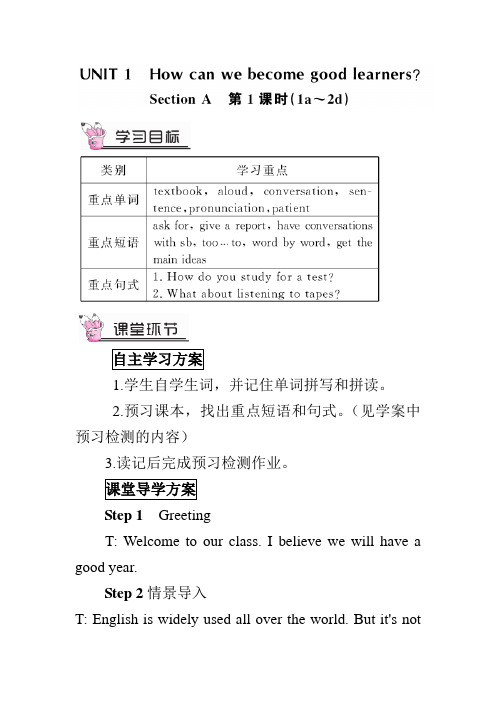
自主学习方案1.学生自学生词,并记住单词拼写和拼读。
2.预习课本,找出重点短语和句式。
(见学案中预习检测的内容)3.读记后完成预习检测作业。
课堂导学方案Step 1GreetingT: Welcome to our class. I believe we will have a good year.Step 2情景导入T: English is widely used all over the world. But it's noteasy to learn English well for us. Because we have no chances to speak English with foreign people. But where there is a will, there is a way. If we keep on speaking and using it, we can learn it well.Questions:T: Can you tell me how you learn English?Ss:_______________________________1. I learn English by listening to the tapes.2. I learn English by reading aloud.…环节说明:通过和学生互动导入新课,引出新课的中心句—How do you study for a test? —By doing sth.。
Step 3完成教材1a~2d的任务1.通过实物,如:生词卡,课本,磁带等。
练习句式—How do you study for a test?—I study by ___________.参考案例:T: How do you study for a test?Ss: I study for a test __________.(1)by reading aloud/listening to tapes(2)by asking the teacher for help(3)by getting the main ideas(4)by going over exercise books2.听1b录音,并完成1b的练习。
人教版新目标九年级英语全册教案
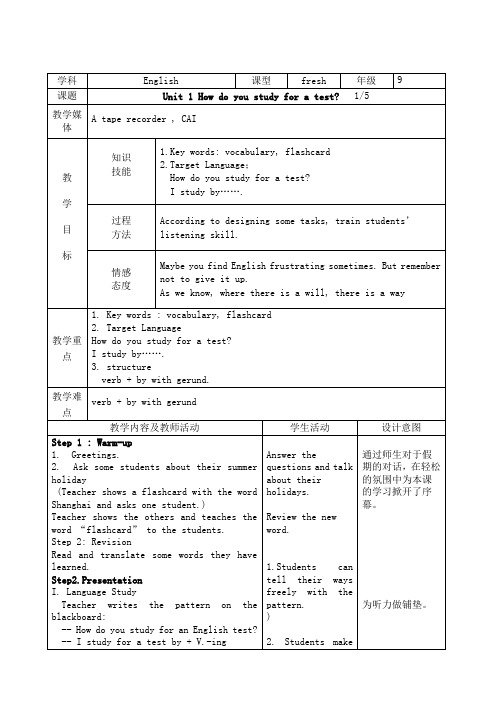
Unit 3 Teenagers should be allowed to choose their own clothes.Section AThe Third PeriodTarget language:A: What rules do you have at home?B: Well, I'm not allowed to go out on school nights. How about you?A: I'm not allowed to go out on school nights either. But I can study at a friend's house.This activity reviews the use of always,sometimes, usually and never.Point to the picture. Ask students to describe what is happening in the picture.Help students to say, The boy is late for class. Invite a student to read the four questions in the box to the class.Read the instructions and remind students of the exact meanings of the adverbs of frequency.Ask students to write A after things they always do, U after things they usually do, S after things they sometimes do and N for things they never do.II. 1bThis activity provides oral practice using the target language.Point out the sample conversation. Ask a pair of students to say it to the class.As the pairs work together, walk around the room offering help if necessary.Ask several pairs to share their conversations with the class.III.2aThis activity provides practice in Look at thepictures and saywhat is happeningin each picture.Students finishthe task on theirown in1aPair work.Talk with his/herpartner abouthis/her answers inActivity 1a.对看图作文能力进行培养。
人教新目标九年级英语全套教案

Unit 1 FriendsLesson 1 IntroductionAims and objectives:- Introduction to the new course and materials.- Reviewing basic greetings and introductions.- Developing listening skills.Teaching aids:- Handouts with greetings and introductions.- Audio equipment for listening activity.Procedure:2. Review basic greetings and introductions with the students. Hand out the greetings and introductions handouts and have the students practice in pairs.3. Play an audio clip of different greetings and introductions and have the students try to match them to the correct written form.4. Discuss any difficulties and provide additional practice if needed.5. Wrap up the lesson by giving the students a brief preview of the next lesson and assigning homework.Lesson 2 Making FriendsAims and objectives:- Learning vocabulary related to making friends.- Practicing using new vocabulary in speaking and writing.- Developing reading and listening skills.Teaching aids:- Vocabulary flashcards.- Handouts with conversation scripts.Procedure:1. Review the vocabulary from the previous lesson with the students using flashcards.2. Introduce new vocabulary related to making friends, such as "hobbies," "interests," and "personality."3. Have the students practice using the new vocabulary in speaking activities. For example, they can interview each other and then report back to the class.4. Hand out conversation scripts and have the students practice the dialogues in pairs.6. Wrap up the lesson by assigning writing homework to reinforce the new vocabulary.Unit 2 School LifeLesson 1 Daily RoutinesAims and objectives:- Learning vocabulary related to daily routines.- Using adverbs of frequency in sentences.- Developing listening and speaking skills.Teaching aids:- Flashcards with daily routine vocabulary.- Audio clip of a daily routine.Procedure:1. Review vocabulary related to daily routines using flashcards.5. Have the students create sentences using the adverbs of frequency and their own daily routines.6. Assign a writing activity where the students describe their daily routine using the new vocabulary and adverbs of frequency.Lesson 2 School RulesAims and objectives:- Learning vocabulary related to school rules.- Practicing giving advice and making suggestions.- Developing reading and speaking skills.Teaching aids:- Vocabulary flashcards.- Handout with school rules.Procedure:1. Review vocabulary related to school rules using flashcards.2. Have the students discuss in pairs what rules they haveat their school.3. Introduce and practice giving advice and making suggestions using sentence structures like "Youshould/shouldn't..." and "Why don't you...?"4. Hand out a list of school rules and have the students discuss in pairs which rules they agree or disagree with and why.6. Wrap up the lesson by having the students give advice to their teacher on how to improve school rules and procedures.Unit 3 HobbiesLesson 1 Hobbies and InterestsAims and objectives:- Learning vocabulary related to hobbies and interests.- Practicing describing hobbies and interests using adjectives.- Developing speaking and listening skills.Teaching aids:- Vocabulary flashcards.- Handout with questions about hobbies and interests.Procedure:1. Review vocabulary related to hobbies and interests using flashcards.2. Teach and practice using adjectives to describe hobbies and interests.3. Hand out a list of questions about hobbies and interests and have the students interview each other in pairs.4. Wrap up the speaking activity by having some students share their partner's hobbies and interests with the class.6. Assign a writing activity where the students describe their favorite hobby using the new vocabulary and adjectives.Lesson 2 Weekend ActivitiesAims and objectives:- Practicing using different tenses to talk about past, present, and future activities.- Developing reading and speaking skills.Teaching aids:- Handouts with conversation scripts.- Textbook with reading passage.Procedure:1. Review using different tenses by giving examples of past, present, and future activities.2. Hand out conversation scripts and have the students practice in pairs using different tenses to talk about their weekend activities.4. Discuss the reading passage as a class, highlighting the different tenses used.5. Wrap up the lesson by having the students share their own weekend activities using different tenses.These lesson plans provide a general outline for teaching the units in the "New Target" ninth-grade English textbook. Teachers can adapt the activities and materials based on the specific needs and abilities of their students.。
人教新目标九年级英语上册教案:Unit 10单词课
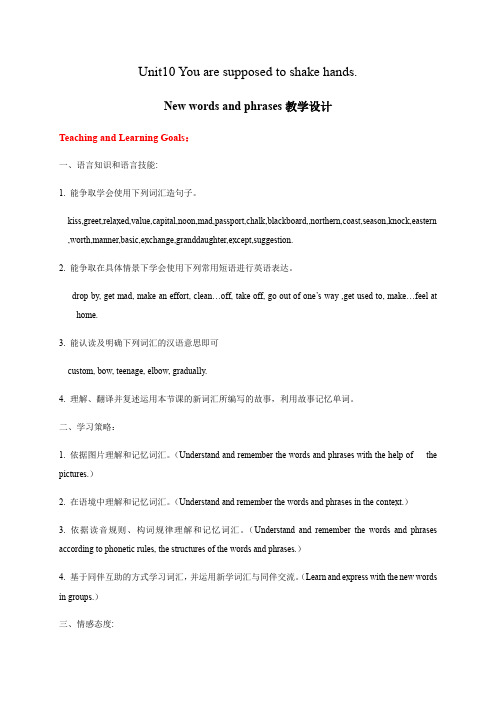
Unit10 You are supposed to shake hands.New words and phrases教学设计Teaching and Learning Goals:一、语言知识和语言技能:1. 能争取学会使用下列词汇造句子。
kiss,greet,relaxed,value,capital,noon,mad,passport,chalk,blackboard,,northern,coast,season,knock,eastern ,worth,manner,basic,exchange,granddaughter,except,suggestion.2. 能争取在具体情景下学会使用下列常用短语进行英语表达。
drop by, get mad, make an effort, clean…off, take off, go out of one’s way ,get used to, make…feel at home.3. 能认读及明确下列词汇的汉语意思即可custom, bow, teenage, elbow, gradually.4. 理解、翻译并复述运用本节课的新词汇所编写的故事,利用故事记忆单词。
二、学习策略:1. 依据图片理解和记忆词汇。
(Understand and remember the words and phrases with the help of the pictures.)2. 在语境中理解和记忆词汇。
(Understand and remember the words and phrases in the context.)3. 依据读音规则、构词规律理解和记忆词汇。
(Understand and remember the words and phrases according to phonetic rules, the structures of the words and phrases.)4. 基于同伴互助的方式学习词汇,并运用新学词汇与同伴交流。
(完整版)人教版新目标九年级英语全册学案及教学设计【经典】
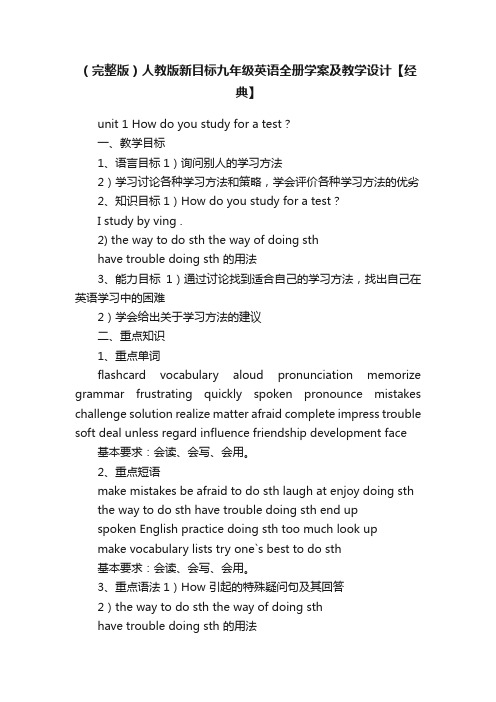
(完整版)人教版新目标九年级英语全册学案及教学设计【经典】unit 1 How do you study for a test?一、教学目标1、语言目标1)询问别人的学习方法2)学习讨论各种学习方法和策略,学会评价各种学习方法的优劣2、知识目标1)How do you study for a test?I study by ving .2) the way to do sth the way of doing sthhave trouble doing sth 的用法3、能力目标1)通过讨论找到适合自己的学习方法,找出自己在英语学习中的困难2)学会给出关于学习方法的建议二、重点知识1、重点单词flashcard vocabulary aloud pronunciation memorize grammar frustrating quickly spoken pronounce mistakes challenge solution realize matter afraid complete impress trouble soft deal unless regard influence friendship development face 基本要求:会读、会写、会用。
2、重点短语make mistakes be afraid to do sth laugh at enjoy doing sth the way to do sth have trouble doing sth end upspoken English practice doing sth too much look upmake vocabulary lists try one`s best to do sth基本要求:会读、会写、会用。
3、重点语法1)How 引起的特殊疑问句及其回答2)the way to do sth the way of doing sthhave trouble doing sth 的用法基本要求:理解其含义,学以致用。
人教版新目标九年级上册英语全册教案集
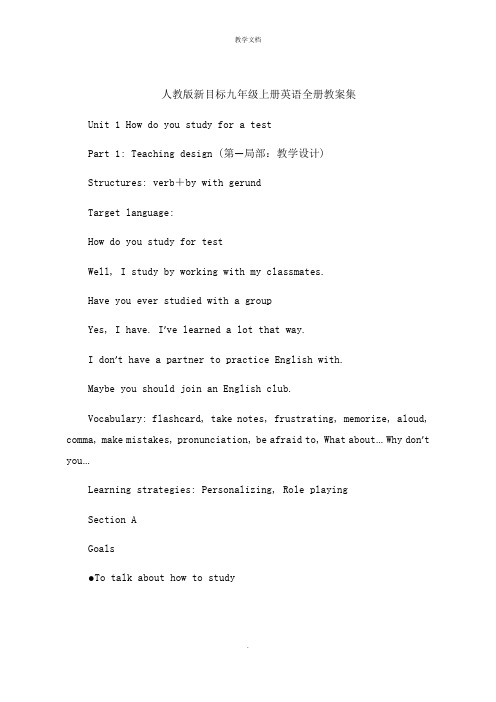
人教版新目标九年级上册英语全册教案集Unit 1 How do you study for a testPart 1: Teaching design (第—局部:教学设计)Structures: verb+by with gerundTarget language:How do you study for testWell, I study by working with my classmates.Have you ever studied with a groupYes, I have. I’ve learned a lot that way.I don’t have a partner to practice English with.Maybe you should join an English club.Vocabulary: flashcard, take notes, frustrating, memorize, aloud, comma, make mistakes, pronunciation, be afraid to, What about…Why don’t you…Learning strategies: Personalizing, Role playingSection AGoals●To talk about how to study●To read about how to studyProceduresWarming up by greetingHello, everyone!From now on you are a ninth grader. Congratulations to you and I wish you a great success in your studies!Today we shall take up the first unit in this new term, Unit 1 How do you study for a testLook at the blackboard and read after me the target language for this unit. When you read pay attention to the structure of the sentence.▲How do you study for test▲Well, I study by working with my classmates.▲Have you ever studied with a group▲Yes, I have. I’ve learned a lot that way.▲I don’t have a partner to practice English with.▲Maybe you should join an English club.Learning to Learn is very important. And learning to pass a test is also very important to you.Learning couldn’t be easier!If you have not developed good ways or methods to study for a test, talk to your classmates about it, your parents, or the teacher like me if you are brave enough. You should be brave enough to talk to others about your problems with your studies.Next I’d like to give you some useful practical advice about studying for a test and also ask you questions to make you think about things such as:▲using your time effectively▲motivation▲how to learn your lessons in the ninth grade year▲different modes of teaching you may meet▲how to develop particular skills, such as note-taking in class 1A: Checking the ways you studyNext turn to page 2 and check √ the ways you study for an English test. Then add other ways you use sometimes.▲How do you study for a testI study for a test___By reading to the tape; By underlining the expressions; By reading beyond the text; By doing used exam papers; By going over exercises books; By copying down the text; By learning the text by heart; By speakingwith classmatesNow raise your hand and report your added ways to the class. I will make a list of all the added ways on the blackboard.1b Listening and writingListen to understand how these people in the picture on page 2 study for a test. Write letters from the pictures. While listening, pay attention to the structures of the sentences.Section A 1b TapescriptBoy1: Hey, gang. There’s a big test on Tuesday. I really need some help. Can you tell me how you study for a big testVoices: Sure! Yes. Sure we will.Boy1: You did really well on the last English test, didn’t you, Mei Girl1: Yeah, I did OK.Boy1: Well, how did you study?Girl1: By making flashcards.Boy1: Maybe I’ll try that. How did you study, PierreBoy2: By asking the teacher for help. She was really happy I asked.Boy1: That’s interesting. How do you study, AntonioBoy3: I like to study by listening to cassettes. But sometimes mymother thinks I’m listening to music. And then she gets mad.Boy1:Oh, well…1c Doing a pairworkNow in pairs ask your partner how he or she studies for a test.A: How do you study for a testB: I study by working with a group.C: I study by listening to English.D. I study by playing games with my classmates.E. I study by doing actions such as coloring, matching.F. I study by singing English songs.G. I study by writingletters and emails.H. I study by acting out simple dialogues.I. I study by listening to and understanding stories.J. I study by writing simple sentences.K. I study by imitating from the recording.L. I study by speaking out words or phrases.M. I study by doing simple role plays.N. I study by reading and understanding simple stories.O. I study by using daily expressions.P. I study by performing short plays.Q. I study by performing simple rhymes.R. I study by writing sentences for pictures.S. I study by writing out simple poems.T. I study by reading aloud correctly.U. I study by playing text plays.V. I study by working with classmates.W. I study by going over the text before class.X. I study by copying words and expressions.Y. I study by looking and saying.Z. I study by asking others questions.2a Listening and checkingNow let’s go to page 3. Listen to the tape and check the questions you ask.While listening, pay attention to the structures of the sentences.Section A 2a, 2b TapescriptGirl1: Welcome to the English club. Today we’re going to talk about the best ways to learn English. Who has an ideaBoy1: Do you learn English by watching English-language videos Girl2: No. It’s too hard to understand the voices.Boy1: What about keeping a diary in English Do you learn English that wayGirl2: I think so. It helps to write English every day.Girl3: Have you ever studied with a groupGirl2: Yes, I have! I’ve learned a lot that way.Girl1: Do you ever practice conversations with a friendGirl2: Oh, yes. It improves my speaking skills.Boy1: What about reading aloud to practice pronunciationGirl3: I do that sometimes. I think it helps.Boy2: I do too. And I always look up new words in a dictionary.Girl3: That’s a great idea!2b Listening and matchingListen again and match each question from 2a with an answer in the box on page 3.2c Doing a pairworkNext we are going to make a conversation in pairs using the information from activities 2a and 2b.A: Have you ever studied with a groupB: Yes, I have. I’ve learned a lot that way.A: Have you ever learned English by watching videosB: Yes, I have. I’ve learned a lot that way.A: Have you ever practiced conversations with friendsB: Yes, I have. I’ve learned a lot that way.A: Have you ever listened to tapesB: Yes, I have. I’ve learned a lot that way.A: Have you ever read aloud to practice pronunciationB: Yes, I have. I’ve learned a lot that way.3a Reading the article and completing the chart1.Reading to the tapeWe are going to read the article on page 4. First we shall read to the tape together. That is, we start reading aloud as the recorder goes, and we stop reading aloud as the recorder stops. While reading, let’s pay enough attention to the pauses, the pronunciation and the intonation of the native reader. Make our reading aloud as the same as the reader’s.2.Reading and dividing the article into partsNext we are going to read aloud the article slowly and clearly. We will try to divide it into thought groups.3.Reading and underliningWe shall read the article once again, this time, to underline all the useful expressions in it. After school, you are going to write them down in your notebook.This week/ we asked students/ at New Star High School/ about the best ways/ to learn more English. Many said/ they learnt/ by using English. Some students had more specific suggestions. Lillian Li, for example, said/ the best way/ to learn new words/ was by reading English magazines. She said that/ memorizing the words of pop songs/ also helped/ a little. When we asked about studying grammar/ she said, “I never study grammar. It's too boring.〞Wei Ming feels differently. He's been learning English/ for six years/ and really loves it. He thinks/ studying grammar /is a great way/ to learn a language. He also thinks that/ watching English movies/ isn't a bad way/ because he can watch the actors/ say the words. Sometimes, however, he finds watching movies/ frustrating/ because the people speak too quickly.Lin Chang said that/ joiningthe English club/ at school/ was the best way/ to improve her English.Students get lots of practice/ and they also have fun. She added that/ having conversations/ with friends/ was not helpful/ at all. ;We get excited/ about something/ and then/ end up speaking/ in Chinese,〞 she said.4.Translating and completing the chartBecause you have read this article many times you are going to translate it into Chinese first and then complete the chart on page 4.Who will be the first to have a tryWays of learning EnglishNot successfulOKSuccessfulLillian LiStudying grammarmemorizing the words of pop songsreading English magazinesWei Mingwatching movieswatching English moviesstudying grammar Liu Changhaving conversations/ with friendsjoining the English club3b Doing a pairworkSilence, please! We are going to have a role play in pairs. One of the pair is to be one of the people in 3a. The other is to interview him or her about learning English.Zhao: Excuse me, Li Hong. Could you help me with my EnglishLi: Yes, please. What’s the matterZhao: I have difficulty studying grammar.Li: Grammar I never studying grammar. I study English mostly by memorizing the words of pop songs.Zhao: No grammar at allLi: Yes, I did study grammar. But I study it by reading English magazines. I put grammar learning into reading articles. That is the best way to understand English grammar.4 Doing a pairworkTurn to page 4 to check √what you do to learn English in the box.Closing down by asking and answering—How did you learn English *I listened to English them every day.*I read English books many times a day.*I learned many English songs by heart.*I sang the English songs to myself.*I learned every new English word in the text.*I learn English by going to English classes.*I do English homework at school.*I read English textbooks in the evening.*I speak English very slowly.*I play computer games in English.*I read a lot of English sentences in the morning.*I do well in class English tests.*I get a lot of good advice on learning English from my teacher. *I discuss English problems with my classmates.*I follow the advice from my father.*I learn English sounds from the tape.*I use English-English dictionaries.*I listen to recordings and English-language TV.*I talk to native speakers every chance I got.*I read books in English, mostly novels.*I learn a lot of new words from English books.*I write more and more e-mail in English.*I use English more than my first language.*Most of my reading (websites and books) is in English. Section BGoals●To listen about learning English●To talk about learning English●To read about learning EnglishProceduresWarming up by reading to the recordingHello, everyone. To begin with, let’s listen and read to the recording of the text HOW DO YOU LEARN BEST That is, read aloud to the tape, as fast as the tape goes, as clearly as the native reader reads. OK Here we go!My cat speaks English.Sometimes my cat comes to me and tells me that she is hungry. Or that her leg hurts. How does my cat tell me these things I don't speak pussy-cat language.1a Reading and checkingLearning English can be both easy and difficult. What things are easy for you And what things are difficult for you Now turn to page 5, read the list on the top and check √the statements that are true for you.1b Making a listYou have read and checked the statements true for you. Now thinkand make a list of other things difficult for you, too.I don’t know how to…!1. I don’t know how to use commas.2. I don’t know how to work with others.3. I don’t know how to make flashcards.4. I don’t know how to read the textbook.5. I don’t know how to make vocabulary lists.6. I don’t know how to listen to tape.7. I don’t know how to ask the teacher for help.8. I don’t know how to study for a test.9. I don’t know how to work with a group.10. I don’t know how to watch English videos.11. I don’t know how to practiceconversations with friends.12. I don’t know how to read aloud to practice pronunciation.13. I don’t know how to learn by using English.14. I don’t know how to get more specific suggestions.15. I don’t know how to read English magazines.16. I don’t know how to learn new words.17. I don’t know how to memorize the words.18. I don’t know how to studying grammar19. I don’t know how to watching English movies20. I don’t know how to joining the English club21. I don’t know how to improve her English22. I don’t know how to get lots of practice13. I don’t know how to ask teachers about the best ways to learn more English.2a Listening and checkingPaul is a nice boy. He works hard at his English, but still has many learning challenges. Now listen to find out what challenges he has and check them in the box on page 5.Challenges to Paul at learning English1._____ can’t get the pronunciation right.2._____ forget a lot of new words.3._____ can’t understand when people talk to me.4._____ can’t understand the words in magazines.5._____ don’t get much writing practices.2b Listening and matchingNow listen again to Paul talking about his challenges at learning English and match them with the solutions listed in the box on page 5. While listening, pay attention to the structures of the sentences.TapescriptTeacher: You look worried, Paul.Boy: I am, Ms Mitchell. I’m having trouble learning English.Teacher: You said you liked English. What’s the problemBoy: I can’t get the pronunciation right.Teacher: Well, listening can help. Why don’t you borrow the teacher’s tapes You can listen to them at home and repeat the sentences that are difficult for you.Boy: That’s a good idea. But what about all the new words I forget a lot of new words.Teacher: You can always write the new words in your notebook and study them at home. You can even study in the train on the way to school.Boy: That might really help! Thanks.Teacher: Can you understand when people talk to youBoy: Well, no. Not always. Sometimes I just don’t understand what people are saying.Teacher: Why don’t you join an English language club to practicespeaking English The English club meets after school on Tuesdays and Thursdays.Boy: Maybe I’ll go. The only other problem I have is that I don’t get much writing practice.Teacher: Maybe you should find a pen pal.Boy: That sounds like a fun way to practice writing. Thanks, Ms Mitchell.2c Doing pairworkIN pairs we are going to role play conversations using the information from activities 2a and 2b.I don’t have a partner to practice English with.Maybe you should join an English language club.I can’t get the pronunciation right.Listening can help.I forget a lot of new words.Write the new words on cards and study them daily.I can’t understand when people talk to me.You can join an English club to talk to people more in English.I can’t understand the words in magazines.You can look them up ina dictionary.I don’t get much writing practices.Start writing an English diaryevery day.I read very slowly.You should read to the recording of the text.I make mistakes in grammar.Why don’t study the basic sentence patterns3a Reading and cuttingIt’s time to read the text HOW I LEARN ENGLISH. Now read and check (/) the sentences.We are going to read the text again to study the form and function of all the predicate verbs.How I learned to learn EnglishLast year/ my English class/ was difficult/ for me. First of all, it wasn't easy/ for me/ to understand the teacher/ when she talked to the class. To begin with, she spoke/ too quickly, and I couldn't understand every word. Later on, I realized that/ it doesn't matter/ if you don’t understand /every word. Also/ I was afraid to speak/ in class, because/ I thought/ my classmates/ might laugh at me. I couldn't always make complete sentences, either. Then/ I started to watch English-language TV. It helped/ a lot. I think that/ doing lots of listening practice/ is of the secrets of becoming a good language learner. Anotherthing/ that I found/ very difficult/ was English grammar. So/ I decided to take lots of grammar notes/ in every class. Then/ I startedto write my own original sentences/ using the grammar/(that) I was learning. It’s amazing/ how much/ this helped. Now/ I am enjoying learning English/ and I got an A/ this term. My teacher is very impressed.Next we shall read the text for the third time to underline all the useful expressions. After class you are to copy them into your notebook.All right, read the text the fourth time and circle all the signal words, or the linking words which connect all the short sentences.Now you may read the statements in the box on page 6 following the text. Write “T〞 or “F〞 beside each statement.3b Writing a letterYour friend Lin Feng is having difficulties with her English. Write her a letter telling her how to become a better English learner.Dear Lin Feng,I know it isn’t easy to learn English, but I have some ideas that may help. You said you couldn’t understand people who talked fast. Well, you can try to listen for the most important words, not every word. It is difficult to understand by listening what you have not read or what you can’t understand well by reading. To listen well you have to read well. So keep on reading English. Listening and reading to the recording of the text is very important, too. Every text, after being read, should be listened to and read aloud to the tape. At first you may find itdifficult to follow the reader reading aloud the text. Don’t worry. If you keep practicing you will be able to read aloud as fast as the native reader from the tape. And then you can understand people who talk fast in English.Yours,Tai Zuo3c Writing an articleYou have been learning English for at least three years. That is such a long time. Now think about the things that have helped you the most in learning English. Write an article telling others about them.4 Doing an interviewNext we shall do an interview in groups of four. Ask the three group mates about learning English. Take notes of what they say. Tomorrow you shall stand to tell the class about their answers.Q. What isn’t easy about learning EnglishA. Reading is not easy.Q. What do you do about thisA. I try to cut the sentences into thought groups.Q. What is your favorite way to learn more EnglishI read and read aloud a lot. These are the best way.Closing down by singTo end this period let’s sing an English song.Rain, rain, go away,Come again another day,Little JohnnyWants to play.Rain, rain, go to Spain,Never show your face again.SELF CHECK1.Filling in the blankWe shall make a check on our use of expressions first. Turn to page 7 and fill in each blank with the correct word given. Change the form of the word if necessary. Then make your own sentences with each word.Complete the sentencesMake your sentences1. You should write down new English words in a vocabulary list.Don’t trust your memory. Write it down.2. If you don’t know how to spell new words, look them up in a dictionary.I don’t know how to spell your name.3. The best way to improve your English is to join an English club. I’d like to join the school football tea.4. Another thing that he find very difficult was English grammar.I find it easy to learn English.5. This kind of paper feels very soft.Do you feel cold2.Writing an articleTurn to page 7 and write an article about Xu Zheng using the notes on Xu and his essay.Xu Zheng: a boy fond of EnglishMost people in the world speak English as a second language. And so does Xu Zheng.Yesterday I asked Xu Zheng about his ways to learn English. He said he learns by making up conversations and speaking to friends in English. When I asked about studying pronunciation, he said he spent much time on it, but he still found native speakers’ pronunciation difficult to learn.I said to him, “You are a computer student. Why are you so interested in English〞“English popular in science. And it is popular around the world for computers,〞 he told me. “I likewriting notes, watching movies and listening to pop songs. But I like reading in English online most, 〞 added he.Xu Zheng is right. English can really help us understand many newthings from other countries. Let’s learn from Xu Zheng. Let’s be fond of English, too.IReading: How do we deal with our problemsAs English is learned mostly through reading in China, we shall now turn to page 8 to learn to read the article entitled: How do we deal with our problemBefore reading, please go over the vocabulary list for reading on page 146. Get yourself familiarized with all the words and expressions to be found in the article.While reading try to divide the sentences into thought groups and underline all the expressions useful to you. While you are reading it for the second time, try to circle all the linking words and try translating the text into Chinese.How do we deal with our problemRich or poor, young or old, we all have problems. And unless we deal with our problems, we easily become unhappy. Worrying about our problems can affect how we do at school. It can also influence the way we behave with our families. So how do we deal with our problems There are many ways.By learning to forgetMost of us have probably been angry with our friends, parents or teachers. Perhaps they said something you didn't like, or you feltunfair. Sometimes, people can stay angry for years about a small problem. Time goes by, and good friendships may be lost.When we are angry, however, we are usually the ones affected. Perhaps we have seen young children playing together. Sometimes they have disagreements, and decide not to talk to each other. However, this usually does not last for long. This is an important lesson for us: we can solve a problem by learning to forget.By regarding problems as challengesMany students often complain about school. They might feel they have too much work to do sometimes, or think the rules are too strict. We must learn how to change these ;problems; into ;challenges;. Education is an important part of our development. As young adults, it is our duty to try our best to deal with each challenge in our education with the help of our teachers.By thinking of something worseBy comparing yourself to other people, you will find your problems are not so terrible. Think about Stephen Hawking, for example, a very clever scientist, who regards his many physical problems as unimportant. He can't walk or even speak, but he has become very famous and successful. We are probably quite healthy and smart. Let's not worry about problems. Let's face the challenges instead.After reading, copy the underlined expressions into your PhraseBook as home.Expressions from How do we deal with our problemrich or poor, young or old, have problems, deal with one’s problems, become unhappy, worry about one’s problems, do well at school, influence the way, behave well with…, deal with one’s problems, be angry with…, feel unfair, stay angry for years about…, time goes by, lose good friendships, see… playing together, have disagreements, talk to each other, last for long, an important lesson for…, solve a problem by learning to forget, regarding problems as challenges, complain about school, have too much work to do, the rules are too strict, change…into…, an important part of one’]s development, as young adults, be one’s duty, to try one’s best, to deal with…in one’s education, with the help of…, thinking of something worse, comparing…to…, find one’s problems, think about…, for example, a very clever scientist, regards…as unimportant, become very famous and successful, worry about…, face the challenges Part 2: Teaching Resources (第二局部:教学资源)Tips for BeginnersYou are like a new babyBabies learn their language slowly.First they learn to listen.Then they learn to talk.Finally, they can read and write. Listen to English every dayListen to English radio.Watch English TV.Go to English movies.Use online lessons.Make an English/ESL friendMake up conversations.Practice dialogues.Usebeginner textbooks.Read English storiesStart with children's storybooks.Try ESL readers.Read advertisements, signs and labels. Try EnglishClub for Young Learners. Write down new wordsStart a vocabulary (new word) notebook.Write words in alphabetical order (A...B...C...). Make example sentences.Always use an English-English dictionary first. Keep an English diaryStart with one sentence.How do you feelHow is the weatherWhat did you do todayWrite another sentence tomorrow.Visit an English speaking countryLearn English more quickly.Stay with an English family.Hear native speakers talk.Have a fun experience.Unit 2 I used to be afraid of the dark.Part 1: Teaching design (第—局部:教学设计) Structures: used toTarget language:Mario used to be short.Yes, he did. Now he’s tall.I used to eat candy all the time.Did youYes, I did. And I used to chew gum a lot.Vocabulary: used to, dark, spider, insectLearning strategies: Brainstorming ComparingSection AGoals●To learn about the use of used to●To talk about what you used to be likeProceduresWarming up by learning “used to 〞Hi, everyone. Today we’re going to study Unit 2. Its title is I used to be afraid of the dark. In the title we find a phrase“used to 〞. What does it mean How is it used in Englishused to的用法“used to加不定式〞表示过去常常干某事,现在不在干了。
2022-2023学年新人教版九年级上册英语全册教案
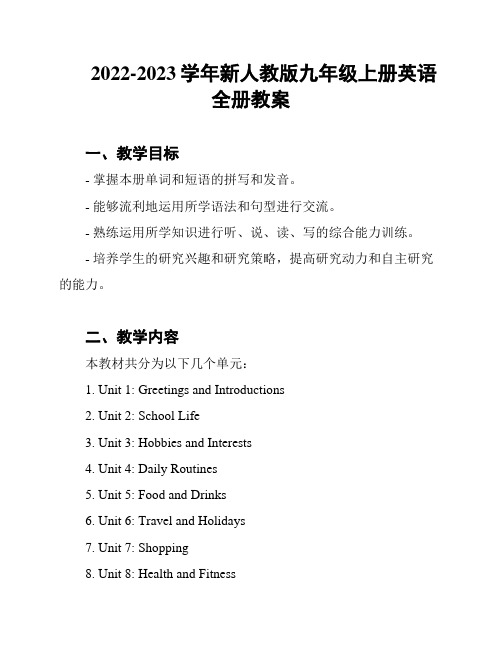
2022-2023学年新人教版九年级上册英语全册教案一、教学目标- 掌握本册单词和短语的拼写和发音。
- 能够流利地运用所学语法和句型进行交流。
- 熟练运用所学知识进行听、说、读、写的综合能力训练。
- 培养学生的研究兴趣和研究策略,提高研究动力和自主研究的能力。
二、教学内容本教材共分为以下几个单元:1. Unit 1: Greetings and Introductions2. Unit 2: School Life3. Unit 3: Hobbies and Interests4. Unit 4: Daily Routines5. Unit 5: Food and Drinks6. Unit 6: Travel and Holidays7. Unit 7: Shopping8. Unit 8: Health and Fitness9. Unit 9: Entertainment and Media每个单元包含以下几个部分:- Vocabulary:研究新词汇和短语,并进行拼写和发音练。
- Grammar:研究新的语法知识和句型,并进行相关练。
- Listening:进行听力训练,培养听力理解能力。
- Speaking:进行口语训练,提高口语表达能力。
- Reading:进行阅读训练,培养阅读理解能力。
- Writing:进行写作训练,提高写作水平。
三、教学方法- 任务型教学:通过任务设置,激发学生的研究兴趣和动力。
- 合作研究:鼓励学生进行小组合作,互相交流和研究。
- 多媒体辅助教学:利用多媒体资源来增强学生的研究效果。
- 游戏化研究:通过游戏和竞赛的方式来提高学生的研究积极性。
四、教学评估- 日常作业:布置练题和作文,检查学生的研究情况。
- 课堂表现:观察学生的参与程度和表现,评估其研究态度和能力。
- 随堂测验:进行小测验,检验学生对所学内容的掌握情况。
- 期末考试:进行综合性的考核,评估学生的研究成果。
九年级英语上册单词教案人教新目标版[修改版]
![九年级英语上册单词教案人教新目标版[修改版]](https://img.taocdn.com/s3/m/e45873fa52ea551811a6873f.png)
第一篇:九年级英语上册单词教案人教新目标版单词教案Airplane n.飞机Coach n.长途公共汽车,客车Departure n.出发;启程;航班;车次Lounge n.(机场等的)等候室departure lounge (机场的)候机厅transport n.交通方式;交通set off 动身,出发Nod v.点头Tear n.眼泪;泪珠Towards prep.往;向;朝...的方向cigarette n.香烟though conj.虽然;尽管get off 下车step n.步; 步骤geography n.地理学physical a.身体的; 体力的PE n. 体育;体育课really adv.非常;很;实在;确实neither pron.两者都不a.(两者)均无的secondary school 中学present a.在场的;出席的absent a.不在的,缺乏的speech n.演讲;演说biology n.生物学lead a ... life safety n.安全过(某种生活) fortunately Disease n.病;疾ad.幸运地病drug n.毒品Dress n.连衣裙SpanishFit v.适合,合身a.西班牙的;西班Glove n.手套牙语的n.西班牙have on 语穿着;戴着Frenchovercoat a.法国的;法语的n.外套;大衣n.法语scarf involve vt.牵涉;n.围巾;头巾牵连;影响thick adj.厚的training n.训练size n.尺码;号athletics n.田径shop assistant 运动n. 店员society n.社会;cool 协会a.时髦的;酷的discofashionable n.迪斯科舞厅;迪a.流行的;时髦的;斯科舞会时尚的either...or... logo n. 标志,商标要么...要么...;well-known adj.众不是...而是... 所周知的;著名的Debate n.辩论designer Illness n.病;疾a. 由著名设计师病设计的n.设计师,prevent设计者vt.防止;预防advertising n. 广medicine n.医学告suppose vt.猜想;dollar n.美元假设succeed relaxedv.成功;做到a.放松的;松弛的show off eldest显示;炫耀a.年龄最大的personality marriedn.个性;性格a.已婚的;结婚的rule n.规则;规章fall off suggestion n.建议(从...)跌落keep to get married 结婚沿着...走couple n.夫妻Rope n.绳子diet n.日常饮食Stream n.小河;溪用心爱心专心clearadj.明白清楚的starvingadj.非常俄的;饥饿难忍的lead the way 领路,带路fall asleep 入睡valley n.山谷peacefuladj.安静的;平静的site n.场所gesturen.示意动作;手势stickn.枝条;枯枝reach out 伸手去摸stilla.静止的;不动的woods n. 树林hillside n.小山坡sudden adj.突然的blood n.血damage n.&vt.损害cause v. 造成;引起n.原因,起因effort n.努力fifth num.第五order n.顺序;命令vt. 命令in order to 为了Director n.主任Smell n.气味Discuss vt.讨论;谈论Fever n.发热Flu n. 流行性感冒Knee n.膝盖Wound n.伤,伤口Miss v.不在Trip v.绊;绊倒1 improvement n.改善;改进oncoming adj.迎面而来的couch n.长沙发expert n.专家require v.需要fit adj.健康的amount n.数量weight n.重量effect n.影响cooker n.厨灶shock n.电击hit vt.打;击glad adj.高兴的breathe v.呼吸cancer n.癌症fix vt.修理finger n.手指basket n.篮子bread n.面包fork n.叉子knife n.刀lemonade n.柠檬味汽水;柠檬饮料pancake n.烙饼薄饼serve vt.端上;服务;招待spoon n.勺;匙hold vt.举办;召开hot adj.辣的roll n.小圆面包Roman n.罗马人Saying n. 格言谚语Cheers int. 干杯Plate n.盘子explanation n.解释,说明cross adj.恼怒的;生气的generally adv.一法般地;通常Level n.水平over adv.结束Certain blind adj.瞎的adv.某些;一些sensen.感觉官能however taste n.味道adv.不管怎样owner n.所有权人;fairly adv.相当地主人no matter bee n.蜜蜂无论…officer n.官员wherever course n.一道菜adv.无论在哪里dialogue n.对话own v.拥有lineeveryday n.台词,对白;线adj.每天的,日常nurse的n.保姆;护士essential recite v.背诵adj.极其重要的role n.角色tourism n.旅游业row n.一排座位quarter n.四分之servant n.仆人一bit n.一部分,一industrial 段adj.工业的play the role of recent adj.近来的v. 扮演...角色Arabic n. 阿拉伯superb adj.极佳的语impressedTyphoon n.台风adj. 印象深刻的Importance front adj.前面的n.重要性nightlife in place of 夜生活代替musicalIndian n.印度人n.音乐剧;音乐电speaker 影n.说某种语言的in the open air 人;发言者;演讲在露天(或户外) 者Japanese adj.日本period n.阶段;时的日语的;日本人期的n.日语;日本人express Industry n.工业vt.表示;表达Trade n.贸易beat n.强节奏Achieve v.完成达ceiling n.天花板到fetch vt.拿来Bright adj.聪明的pardon Handwriting n.书int.请再说一遍用心爱心专心raise v.举起forgive vt.原谅treasure vt.珍视;珍爱stay in touch 保持联系owevt.归因于;归功于pay back 偿还kindness n.体贴patience n.耐心gift n.恩赐礼物fairadj.公平的;公正的model n.模范;典型role model 楷模;行为榜样Valuen.价值;行为准则decision n.决定graduate n.毕业生shock v.使震惊inside adv. 在(或向)里面prep.在(或向)…里cow n.奶牛;母牛dentist n.牙医tooth n.牙齿robot n.机器人第二篇:人教版九年级上册英语单词会议议程一、大会由副主席唐光静主持。
2019-2020年九年级英语上册 单词教案 人教新目标版
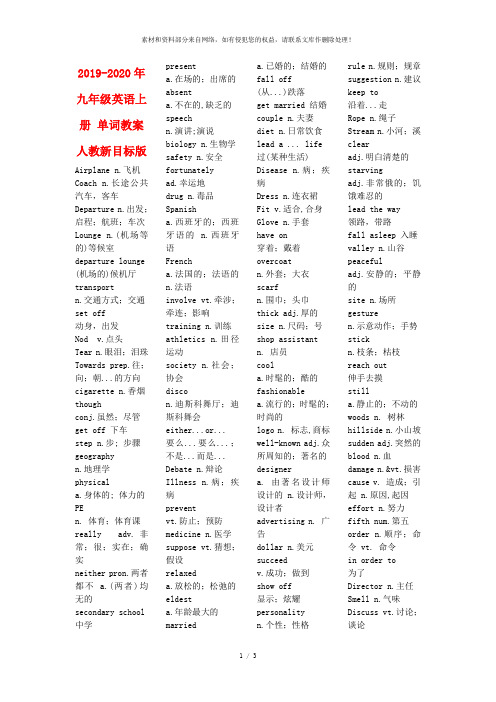
2019-2020年九年级英语上册单词教案人教新目标版Airplane n.飞机Coach n.长途公共汽车,客车Departure n.出发;启程;航班;车次Lounge n.(机场等的)等候室departure lounge (机场的)候机厅transportn.交通方式;交通set off动身,出发Nod v.点头Tear n.眼泪;泪珠Towards prep.往;向;朝...的方向cigarette n.香烟thoughconj.虽然;尽管get off 下车step n.步; 步骤geographyn.地理学physicala.身体的; 体力的PEn. 体育;体育课really adv.非常;很;实在;确实neither pron.两者都不 a.(两者)均无的secondary school 中学presenta.在场的;出席的absenta.不在的,缺乏的speechn.演讲;演说biology n.生物学safety n.安全fortunatelyad.幸运地drug n.毒品Spanisha.西班牙的;西班牙语的n.西班牙语Frencha.法国的;法语的n.法语involve vt.牵涉;牵连;影响training n.训练athletics n.田径运动society n.社会;协会discon.迪斯科舞厅;迪斯科舞会either...or...要么...要么...;不是...而是...Debate n.辩论Illness n.病;疾病preventvt.防止;预防medicine n.医学suppose vt.猜想;假设relaxeda.放松的;松弛的eldesta.年龄最大的marrieda.已婚的;结婚的fall off(从...)跌落get married 结婚couple n.夫妻diet n.日常饮食lead a ... life过(某种生活)Disease n.病;疾病Dress n.连衣裙Fit v.适合,合身Glove n.手套have on穿着;戴着overcoatn.外套;大衣scarfn.围巾;头巾thick adj.厚的size n.尺码;号shop assistantn. 店员coola.时髦的;酷的fashionablea.流行的;时髦的;时尚的logo n. 标志,商标well-known adj.众所周知的;著名的designera. 由著名设计师设计的 n.设计师,设计者advertising n. 广告dollar n.美元succeedv.成功;做到show off显示;炫耀personalityn.个性;性格rule n.规则;规章suggestion n.建议keep to沿着...走Rope n.绳子Stream n.小河;溪clearadj.明白清楚的starvingadj.非常俄的;饥饿难忍的lead the way领路,带路fall asleep 入睡valley n.山谷peacefuladj.安静的;平静的site n.场所gesturen.示意动作;手势stickn.枝条;枯枝reach out伸手去摸stilla.静止的;不动的woods n. 树林hillside n.小山坡sudden adj.突然的blood n.血damage n.&vt.损害cause v. 造成;引起 n.原因,起因effort n.努力fifth num.第五order n.顺序;命令 vt. 命令in order to为了Director n.主任Smell n.气味Discuss vt.讨论;谈论Fever n.发热Flu n. 流行性感冒Knee n.膝盖Wound n.伤,伤口Miss v.不在Trip v.绊;绊倒improvementn.改善;改进oningadj.迎面而来的couch n.长沙发expert n.专家require v.需要fit adj.健康的amount n.数量weight n.重量effect n.影响cooker n.厨灶shock n.电击hit vt.打;击glad adj.高兴的breathe v.呼吸cancer n.癌症fix vt.修理finger n.手指basket n.篮子bread n.面包fork n.叉子knife n.刀lemonade n.柠檬味汽水;柠檬饮料pancake n.烙饼薄饼serve vt.端上;服务;招待spoon n.勺;匙hold vt.举办;召开hot adj.辣的roll n.小圆面包Roman n.罗马人Saying n. 格言谚语Cheers int. 干杯Plate n.盘子explanationn.解释,说明crossadj.恼怒的;生气的generally adv.一般地;通常over adv.结束blind adj.瞎的sensen.感觉官能taste n.味道owner n.所有权人;主人bee n.蜜蜂officer n.官员course n.一道菜dialogue n.对话linen.台词,对白;线nursen.保姆;护士recite v.背诵role n.角色row n.一排座位servant n.仆人bit n.一部分,一段play the role ofv. 扮演...角色superb adj.极佳的impressedadj. 印象深刻的front adj.前面的nightlife夜生活musicaln.音乐剧;音乐电影in the open air在露天(或户外)Japanese adj.日本的日语的;日本人的 n.日语;日本人Industry n.工业Trade n.贸易Achieve v.完成达到Bright adj.聪明的Handwriting n.书法Level n.水平Certainadv.某些;一些howeveradv.不管怎样fairly adv.相当地no matter无论…whereveradv.无论在哪里own v.拥有everydayadj.每天的,日常的essentialadj.极其重要的tourism n.旅游业quarter n.四分之一industrialadj.工业的recent adj.近来的Arabic n. 阿拉伯语Typhoon n.台风Importancen.重要性in place of代替Indian n.印度人speakern.说某种语言的人;发言者;演讲者period n.阶段;时期expressvt.表示;表达beat n.强节奏ceiling n.天花板fetch vt.拿来pardonint.请再说一遍raise v.举起forgive vt.原谅treasurevt.珍视;珍爱stay in touch保持联系owevt.归因于;归功于pay back 偿还kindness n.体贴patience n.耐心gift n.恩赐礼物fairadj.公平的;公正的model n.模范;典型role model楷模;行为榜样Valuen.价值;行为准则decision n.决定graduate n.毕业生shock v.使震惊inside adv. 在(或向)里面 prep.在(或向)…里cow n.奶牛;母牛dentist n.牙医tooth n.牙齿robot n.机器人-----如有帮助请下载使用,万分感谢。
- 1、下载文档前请自行甄别文档内容的完整性,平台不提供额外的编辑、内容补充、找答案等附加服务。
- 2、"仅部分预览"的文档,不可在线预览部分如存在完整性等问题,可反馈申请退款(可完整预览的文档不适用该条件!)。
- 3、如文档侵犯您的权益,请联系客服反馈,我们会尽快为您处理(人工客服工作时间:9:00-18:30)。
单词教案
Airplane n.飞机Coach n.长途公共汽车,客车Departure n.出发;启程;航班;车次Lounge n.(机场等的)等候室departure lounge (机场的)候机厅transport
n.交通方式;交通set off
动身,出发
Nod v.点头
Tear n.眼泪;泪珠Towards prep.往;向;朝...的方向cigarette n.香烟though
conj.虽然;尽管get off 下车
step n.步; 步骤geography
n.地理学
physical
a.身体的; 体力的PE
n. 体育;体育课really adv.非常;很;实在;确实
neither pron.两者都不 a.(两者)均无的
secondary school 中学
present
a.在场的;出席的absent
a.不在的,缺乏的speech
n.演讲;演说biology n.生物学
safety n.安全
fortunately
ad.幸运地
drug n.毒品
Spanish
a.西班牙的;西班
牙语的n.西班牙
语
French
a.法国的;法语的
n.法语
involve vt.牵涉;
牵连;影响
training n.训练
athletics n.田径
运动
society n.社会;
协会
disco
n.迪斯科舞厅;迪
斯科舞会
either...or...
要么...要么...;
不是...而是...
Debate n.辩论
Illness n.病;疾
病
prevent
vt.防止;预防
medicine n.医学
suppose vt.猜想;
假设
relaxed
a.放松的;松弛的
eldest
a.年龄最大的
married
a.已婚的;结婚的
fall off
(从...)跌落
get married 结婚
couple n.夫妻
diet n.日常饮食
lead a ... life
过(某种生活)
Disease n.病;疾
病
Dress n.连衣裙
Fit v.适合,合身
Glove n.手套
have on
穿着;戴着
overcoat
n.外套;大衣
scarf
n.围巾;头巾
thick adj.厚的
size n.尺码;号
shop assistant
n. 店员
cool
a.时髦的;酷的
fashionable
a.流行的;时髦的;
时尚的
logo n. 标志,商标
well-known adj.众
所周知的;著名的
designer
a. 由著名设计师
设计的 n.设计师,
设计者
advertising n. 广
告
dollar n.美元
succeed
v.成功;做到
show off
显示;炫耀
personality
n.个性;性格
rule n.规则;规章
suggestion n.建议
keep to
沿着...走
Rope n.绳子
Stream n.小河;溪
clear
adj.明白清楚的
starving
adj.非常俄的;饥
饿难忍的
lead the way
领路,带路
fall asleep 入睡
valley n.山谷
peaceful
adj.安静的;平静
的
site n.场所
gesture
n.示意动作;手势
stick
n.枝条;枯枝
reach out
伸手去摸
still
a.静止的;不动的
woods n. 树林
hillside n.小山坡
sudden adj.突然的
blood n.血
damage n.&vt.损害
cause v. 造成;引
起 n.原因,起因
effort n.努力
fifth num.第五
order n.顺序;命
令 vt. 命令
in order to
为了
Director n.主任
Smell n.气味
Discuss vt.讨论;
谈论
Fever n.发热
Flu n. 流行性感冒
Knee n.膝盖
Wound n.伤,伤口
Miss v.不在
Trip v.绊;绊倒
improvement
n.改善;改进oncoming
adj.迎面而来的couch n.长沙发expert n.专家require v.需要
fit adj.健康的amount n.数量weight n.重量effect n.影响cooker n.厨灶shock n.电击
hit vt.打;击glad adj.高兴的breathe v.呼吸cancer n.癌症
fix vt.修理finger n.手指basket n.篮子bread n.面包
fork n.叉子
knife n.刀lemonade n.柠檬味汽水;柠檬饮料pancake n.烙饼薄饼
serve vt.端上;服务;招待
spoon n.勺;匙hold vt.举办;召开
hot adj.辣的
roll n.小圆面包Roman n.罗马人Saying n. 格言谚语
Cheers int. 干杯Plate n.盘子explanation
n.解释,说明
cross
adj.恼怒的;生气的generally adv.一
般地;通常
over adv.结束
blind adj.瞎的
sensen.感觉官能
taste n.味道
owner n.所有权人;
主人
bee n.蜜蜂
officer n.官员
course n.一道菜
dialogue n.对话
line
n.台词,对白;线
nurse
n.保姆;护士
recite v.背诵
role n.角色
row n.一排座位
servant n.仆人
bit n.一部分,一
段
play the role of
v. 扮演...角色
superb adj.极佳的
impressed
adj. 印象深刻的
front adj.前面的
nightlife
夜生活
musical
n.音乐剧;音乐电
影
in the open air
在露天(或户外)
Japanese adj.日本
的日语的;日本人
的 n.日语;日本人
Industry n.工业
Trade n.贸易
Achieve v.完成达
到
Bright adj.聪明的
Handwriting n.书
法
Level n.水平
Certain
adv.某些;一些
however
adv.不管怎样
fairly adv.相当地
no matter
无论…
wherever
adv.无论在哪里
own v.拥有
everyday
adj.每天的,日常
的
essential
adj.极其重要的
tourism n.旅游业
quarter n.四分之
一
industrial
adj.工业的
recent adj.近来的
Arabic n. 阿拉伯
语
Typhoon n.台风
Importance
n.重要性
in place of
代替
Indian n.印度人
speaker
n.说某种语言的
人;发言者;演讲
者
period n.阶段;时
期
express
vt.表示;表达
beat n.强节奏
ceiling n.天花板
fetch vt.拿来
pardon
int.请再说一遍
raise v.举起
forgive vt.原谅
treasure
vt.珍视;珍爱
stay in touch
保持联系
owe
vt.归因于;归功于
pay back 偿还
kindness n.体贴
patience n.耐心
gift n.恩赐礼物
fair
adj.公平的;公正
的
model n.模范;典型
role model
楷模;行为榜样
Value
n.价值;行为准则
decision n.决定
graduate n.毕业生
shock v.使震惊
inside adv. 在(或
向)里面 prep.在
(或向)…里
cow n.奶牛;母牛
dentist n.牙医
tooth n.牙齿
robot n.机器人。
